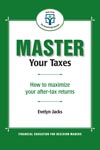Last updated: April 26 2011
Tax Planning: Post Midnight May 2
1. Leverage Your Tax Refund
Resist the temptation to buy yet another flat-screen TV. Now is the time to make the commitment to your RRSP, your Tax Free Savings Account and paying down your consumer debt. But what comes first? This may be a question for tax advisors, financial advisors and their clients to review together.
Your RRSP will reduce your net income, the figure used to determine the size of clawback to refundable tax credits like the Child Tax Benefit or GST Credit and social benefits like the Old Age Security or Employment Insurance. It will also increase non-refundable tax credits for 2012, based on net income: Age Amount, Spouse Amount and Medical Expenses to name a few.
Only 6% of Canadians maximize their RRSP room each year. Find out what you missed out on by not making the contribution last year. Then find out just how effective your RRSP savings will be in helping you build wealth this year.
2. Catch up on late-filed returns.
Whatever your reason for missing your tax filing deadline, again and again ó too busy, afraid you'll owe, too disorganized ó make it your plan to catch up, especially if the government owes you a refund. It doesn't make sense to give the government an interest-free loan which could instead be working for you invested in a TFSA, RRSP or other savings account.
Failing to file tax returns also causes other misses with your tax-efficient investment strategies: RRSP room is not calculated for the missed years, capital losses are not reported and refundable tax credits to which you are entitled languish for your attention in government coffers.
3. Know What's Coming.
There is a lot we know about your tax advantages for the current tax year, 2011. For example, provincial budgets have recently been tabled in all provinces and territories, and we also know the federal tax brackets and rates, and the indexed amounts for non-refundable tax credits. In addition, the last federal budget introduced changes to tax law that were shelved for now, but it would not be surprising to see many of the provisions re-introduced in the future. As a minimum, do consider whether you can reduce withholding taxes as a result of your tax reporting in 2010, and in addition, review whether instalment payments will be necessary for the rest of 2011. If not, you'll be able to invest the difference, or pay down debt, both of which would be to your fiscal advantage.
For a post-tax season, post-election review of those provisions, do join the Knowledge Bureau in Winnipeg, Calgary, Vancouver and Toronto for a VIP breakfast event. For more information and to register, please see our KB Community page!

